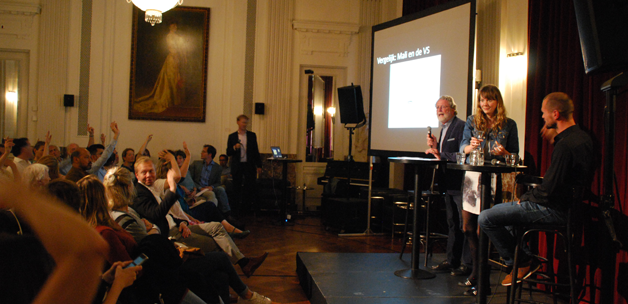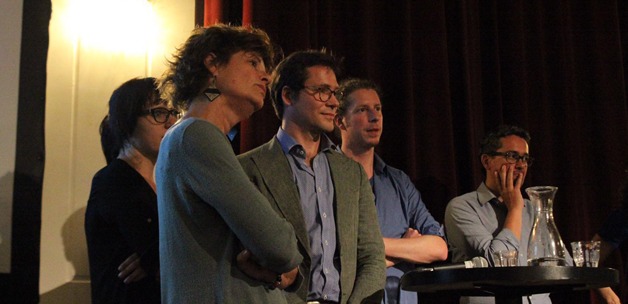The United Nations peacekeeping mission in Mali, MINUSMA, has been operative for almost four years. Many governments have supported the mission by sending soldiers – among them the Netherlands. Yet despite the reasonably large Dutch involvement there has been little debate. To fill this gap, Michiel Zonneveld organized a live debate in Amsterdam on the MINUSMA mission together with The Broker, Tertium, VU University Amsterdam and Vrij Nederland. Sahel Watch coordinator Karlijn Muiderman took part in the debate. During the debate two main questions were posed: Why is there such limited public debate on Dutch involvement in Mali? And, moreover, are there ways in which the mission can be made more effective?

Click here to visit the living analysis
During the debate, four academics from different backgrounds (see names and titles at end of this page) presented solutions on the current issues experienced on the ground in Mali. In response, a ‘societal panel’, composed of three people with recent experience working in Mali, and the audience reacted to each in a short discussion.
PowerPoint presentations of the live debate (in Dutch)
A frustratingly complex crisis
The scene for the debate was set by a remarkable guest: ex-helicopter pilot Peter Gordijn. Gordijn served in MINUSMA and received a lot of media attention due to his criticism of the way peacekeeping missions operate. Gordijn witnessed the 2014/2015 GATIA advances in Mali and, despite the mission’s mandate to protect civilians, was under orders to observe and report only. Frustrated with doing nothing, he argued for what he called ‘pro-active impartial action’, where a peacekeeping process is actively supported by holding potential spoilers to agreed rules, as a kind of ‘referee’.
But is this a solution to the problems faced by peacekeeping missions worldwide? As always, the context of the mission should largely guide the strategy. In Mali, a multiplicity of parties – the army, various self-defence militias, and the numerous rebel and jihadist groups – all with different aims, now occupy the northern Malian landscape. In the middle of this is a population made up of many different ethnic groups, trying to make a living, often informally and across borders. As Fred van der Kraaij and The Broker’s Karlijn Muiderman sketched the Malian context in all its complexity, it became clear that resolving this crisis would take more than containing spoilers.
Mali’s expansive north has been the scene of various uprisings since Mali’s independence from France in 1960. Its northern population has historically dealt with insecure livelihoods by engaging in informal trade, which today is viewed as smuggling. These same desert routes have been taken over by militant groups moving weapons, drugs and people, creating further instability and insecurity, and leaving northern communities with few other livelihood and security options.

Making and unmaking security
Presenting at the debate, Dieuwertje Kuipers emphasized that, at its core, the crisis is a political and socio-economic problem – to which you cannot apply military solutions. As a nation-state, Mali is still young – less than 60 years old. The country is still being built and faces high levels of corruption, among other issues. We should not be surprised by current developments, and we should not expect the issues to be solved within a few years. According to Kuipers “one election does not make a democracy”. There was a general sense among the panellists that, with all of the political negotiations, militias and mandates, the UN mission has lost sight of the human perspective.
Having studied Mali’s majority ethnic group between the north and south, the Fulani, for years, Mirjam de Bruijn said that it is local people who “make and unmake security”. Taking the introduction of mobile telecommunications in northern Mali as an example, she explained how this has brought about changes that are feeding into the crisis as it progresses. Upsetting the traditional hierarchies within the Fulani community, mobile phones have created a whole new regional (informal) economy.
Additionally, their introduction has facilitated close contact between jihadist groups and northern communities, after the government was driven from the area. As it turns out, jihadists did answer the phone when people reached out to them with their problems. Meaning that, through this technology, jihadist for a short period were able to provide basic (government) services. In the process, they have also used mobile phones to spread a new discourse of ethnic marginalization, mirroring that of the Tuareg.
Being part of the change
So how can this knowledge make MINUSMA more effective? Asked what MINUSMA can do, especially regarding rising extremism among the Fulani, de Bruijn said it would be difficult to change things now. Once change comes, it cannot be undone, she argued: “I have no solution” – implying that we cannot go back, but can only try to change Mali more. Participating in a peacekeeping mission means you are part of the change and, consequently, “have assumed a responsibility towards these people”, said de Bruijn.
Yet, many of the other panellists focused on MINUSMA’s mandate and sought to identify where improvements could lead to better results on the ground. Kenneth Manusama, for instance, noted that it remains unclear when MINUSMA can take action to protect civilians – which is one of its core tasks, according to its mandate. In addition, the mandate does not address socio-economic root causes, despite its integrated approach.
Kuipers argued that the mandate is a type of in-between solution that reflects a political ‘wish’ for good news; its vagueness makes it nearly impossible not to achieve what the mission set out to do. Therefore, she called on the Dutch government to “do it right, or don’t do it”. She argued that more openness from the Dutch military is needed about what the Dutch army can and cannot achieve when asked to participate in international missions – stretched for resources as it is. Additionally, she said that the Ministry of Defence should be less afraid of taking risks, including saying no to a mission. Moreover, referencing ‘The Hague screwdriver’, she noted that parliament should not try to micro manage missions – as it often results in them being less effective. But what kind of risks the Dutch government should take and how they will affect the public debate remains unclear.

Many questions, few solutions
In the ensuing debate, one audience member who had taken part in drafting the mandate of MINUSMA put a more realist perspective on some of the things said. He emphasized that, first, peacekeeping missions are at the invitation of the host country, second, mandates are negotiated by the countries taking part in these UN missions, third, such mandates must be approved by the UN Security Council as well as the host country’s recognized government and, fourth, MINUSMA is strictly a military mission. These circumstances all limit what we can expect such a mission to achieve. The question was, he said, whether it really is desirable to attach clear, fixed and measurable end goals to such a mission. Stability and the rule of law are difficult to measure, so how do you decide when enough has been achieved?
No answer to this question was found; however, Pim Klaassen did introduce some practical recommendations for future mission planning. Citing the example of innovation process management, he advised that peace missions should ensure they are inclusive and anticipatory, aimed at sustainable outcomes, and in agreement with societal values. For MINUSMA, this means incorporating recurring moments for decision making in adjustment of its mandate. He said that the mission should plan by working backwards from the desired outcome – a method called ‘backcasting’ – and that it should put more effort into involving stakeholders in the planning phase.
So the main question that led to this debate remains open, namely, why is there so little attention – especially from the Dutch media – on this mission. One thing that did become apparent is that a lot of confusion exists among academics and the general public alike about what peacekeeping missions actually do and what we can expect of them. This reflects a distance between the public debate, including the media, and the political debate. Clearly, there is need for debate on improving peacekeeping missions in general, and processes are in place for critical reflection (see for instance the recent peacekeeping review). This debate made one thing clear: that at the end of the day, the debate is not over. How should such improvement come about? The UN Security Council is one of the places where real change is achieved. Does this mean that more transparency about the role and function of the UN and international peacekeeping missions is needed? What role should public debate play? These are some of the questions that arose from this debate that are yet to be answered.
Societal panel: Peter Gordijn (ex-helicopter pilot MINUSMA), Gabrielle Provaas (filmmaker), Victor van der Linden (Fair & Sustainable Mali)
Contextual introduction: Fred van der Kraaij (retired development economist, worked with the Malian Ministry of Planning), Karlijn Muiderman (coordinator Sahel Watch, The Broker)
Scientific panel: Mirjam de Bruijn (professor of anthropology, African Studies Centre), Dieuwertje Kuipers (PhD candidate High Risk Studies, VU University), Pim Klaassen (researcher on responsible innovation and research, VU University), Kenneth Manusama (assistant professor of law, VU University)
Organized together with Michiel Zonneveld, the debate was part of ‘De Oplossers Live’, a Dutch debating programme of Tertium, VU University Amsterdam, and Vrij Nederland.
